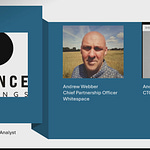Good Morning Team.
Today, I enjoyed a good chat with Karl Akueson, CEO of Switch Metals, to explore his journey from London investment banking to leading one of West Africa’s most promising early-stage critical metals companies.
Karl shares how his education at Manchester and Imperial helped prepare him for the leap from BMO to founding mining ventures in Côte d’Ivoire, and he walks us through the evolution of Switch Metals — from its local roots to the AIM listing in London through a SPAC merger with Oneiro Energy.
The conversation dives deep into the strategic case for tantalum, a little-known but high value metal trading at $250/kg. Karl explains why tantalum is overlooked compared to nickel or lithium, the ‘conflict-free premium’ Switch commands as an ethical alternative, and how the unique processing landscape — dominated by the US, Germany and Japan, instead of China — gives Switch a powerful geopolitical advantage.
We also cover why Switch is deliberately building during a weaker market, with tantalum prices far below 2022 peaks, and how this shapes both its development timeline and financing strategy.
On the operational side, Karl details the Issia project’s two-phase development plan, starting with shallow placer deposits before transitioning to hard rock mining.
He outlines what to expect from the maiden resource estimate due in early 2026, why Switch’s capital requirements are remarkably low at under $5 million, and how their new pilot wash plant will process material from soil to tantalum concentrate.
We also discuss the key technical risks in Phase 1 and the bootstrap model that underpins Switch’s approach.
The discussion then covers the jurisdictional advantages of operating in Côte d’Ivoire. Karl explains how living in Abidjan and having local directors helps manage political risk and provides credibility with stakeholders, while also aligning Switch with President Ouattara’s goal of making mining a national economic pillar alongside cocoa.
He also addresses regional security challenges, the company’s monitoring strategy, and contingency planning for potential instability in the Sahel region.
From a financial perspective, Karl walks us through how Switch plans to fund Phase 1 while minimising dilution, the potential role of strategic partnerships, and how the company balances tantalum with optional exposure to lithium, niobium, and rare earths at its other projects.
He also discusses early interest from downstream users and larger mining companies keen on securing supply of critical metals.
Looking at industry positioning, Karl shares how Switch is working with Electronic Wastes Africa on e-waste recycling and urban mining, and whether this could become a meaningful revenue stream alongside traditional mining.
He reflects on lessons learned from Awalé Resources — now partnered with Newmont on the TSXV — and explains how Switch plans to sustain its first-mover advantage in Ivorian critical metals as other companies inevitably follow.
Finally, Karl lays out his vision for 2030: where he sees Switch Metals five years from now, whether the company is building to operate long term, or positioning itself for strategic acquisition once its assets are proven.
Switch Metals is carving out a leadership position in one of the most overlooked corners of the critical minerals sector.
It’s early days.









